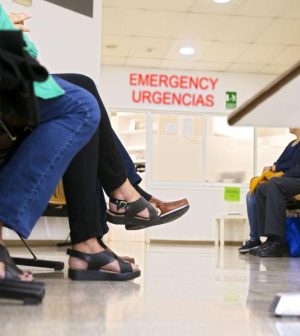- Could Your Grocery Store Meat Be Causing Recurring UTIs?
- Are You Making This Expensive Thermostat Error This Winter?
- Recognizing the Signs of Hypothyroidism
- 10 Strategies to Overcome Insomnia
- Could Artificial Sweeteners Be Aging the Brain Faster?
- Techniques for Soothing Your Nervous System
- Does the Water in Your House Smell Funny? Here’s Why
- Can a Daily Dose of Apple Cider Vinegar Actually Aid Weight Loss?
- 6 Health Beverages That Can Actually Spike Your Blood Sugar
- Treatment Options for Social Anxiety Disorder
1 in 20 ER Visits Involve Homeless People

At major medical centers across the southeast, 1 in every 20 visits to emergency departments involve people who are homeless or face “housing insecurity,” a new U.S. study finds.
Concerns of suicide was the leading medical reason bringing these types of patients to the ER and many were uninsured, said a team reporting recently in the journal JAMA Network Open.
“As homelessness and housing insecurity continue to rise throughout the country, we need to make it a priority to improve care for this susceptible and often overlooked patient population,” said study senior author Dr. Jennifer Hess. She’s an assistant professor of emergency medicine in Vanderbilt University Medical Center (VUMC) in Nashville, Tenn.
Hess’ group looked at data from nearly 24,000 emergency department visits at centers across the southeast.
They found that 5% of those visits involved people who were either homeless or housing insecure.
Many of those tended to in emergency departments had made multiple visits, the study showed.
It’s no surprise that one in every 20 folks visiting the ER are homeless: As the researchers noted in a news release, “unstable housing and homelessness can exacerbate adverse health outcomes, leading to increased risk of chronic disease, injury and disability.”
Spotting homeless patients could be helpful to patients and health care staff, said study author Madeleine Ball, a Vanderbilt medical student and 2023-2024 Research Committee Lead for VUMC’s Homeless Health Service.
“Directing resources toward patients who come to the emergency department regularly could have significant impact for patients,” she said in Vanderbilt news release. “Our study emphasizes the utility of screening for homelessness in all acute care centers to best tailor and optimize care for this susceptible patient population.”
More information
There’s more on the health care of homeless people at the National Health Care for the Homeless Council.
SOURCE: Vanderbilt University Medical Center, news release, April 26, 2026
Source: HealthDay
Copyright © 2026 HealthDay. All rights reserved.










